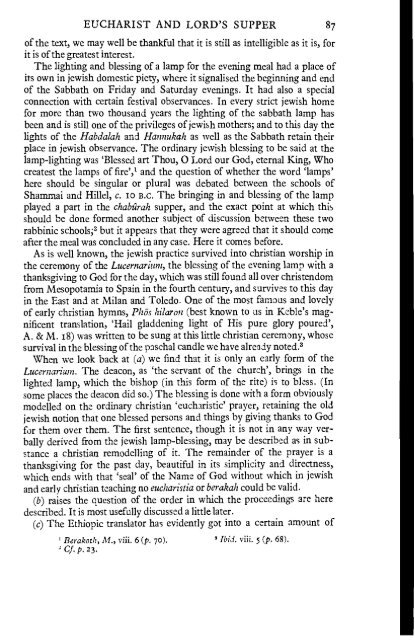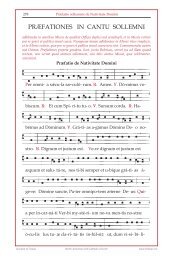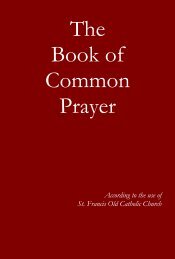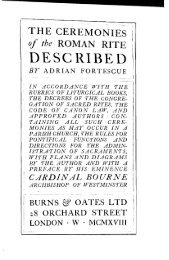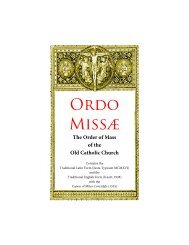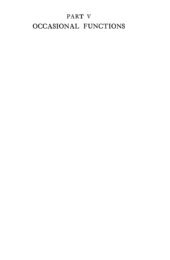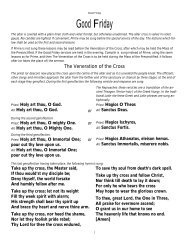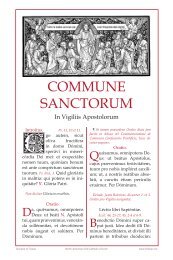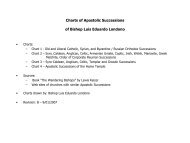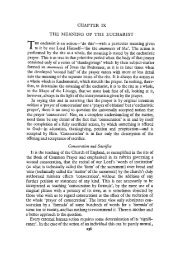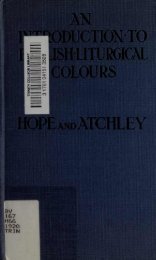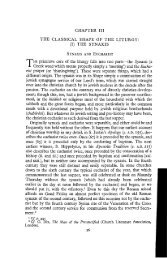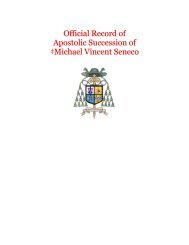Eucharist and Lord's Supper
Eucharist and Lord's Supper
Eucharist and Lord's Supper
You also want an ePaper? Increase the reach of your titles
YUMPU automatically turns print PDFs into web optimized ePapers that Google loves.
EUCHARIST AND LORD'S SUPPER<br />
of the text, we may well be thankful that it is still as intelligible as it is, for<br />
it is of the greatest interest.<br />
The lighting <strong>and</strong> blessing of a lamp for the evening meal had a place of<br />
its own in jewish domestic piety, where it signalised the beginning <strong>and</strong> end<br />
of the Sabbath on Friday <strong>and</strong> Saturday evenings. It had also a special<br />
connection with certain festival observances. In every strict jewish home<br />
for more than two thous<strong>and</strong> years the lighting of the sabbath lamp has<br />
been <strong>and</strong> is still one ofthe privileges of jewish mothers; <strong>and</strong> to this day the<br />
lights of the Habdalah <strong>and</strong> Hannukah as well as the Sabbath retain their<br />
place in jewish observance. The ordinary jewish blessing to be said at the<br />
lamp-lighting was 'Blessed art Thou, 0 Lord our God, eternal King, Who<br />
createst the lamps of fire',! <strong>and</strong> the question of whether the word 'lamps'<br />
here should be singular or plural was debated between the schools of<br />
Shammai <strong>and</strong> Hillel, c. 10 B.C. The bringing in <strong>and</strong> blessing of the lamp<br />
played a part in the chabUrah supper, <strong>and</strong> the exact point at which this<br />
should be done formed another subject of discussion between these two<br />
rabbinic schools;2 but it appears that they were agreed that it should come<br />
after the meal was concluded in any case. Here it comes before.<br />
As is well known, the jewish practice survived into christian worship in<br />
the ceremony of the Lucernarium, the blessing of the evening lamp with a<br />
thanksgiving to God for the day, which was still found all over christendom<br />
from Mesopotamia to Spain in the fourth century, <strong>and</strong> survives to this day<br />
in the East <strong>and</strong> at Milan <strong>and</strong> Toledo. One of the most famous <strong>and</strong> lovely<br />
of early christian hymns, PhOs hilaron (best known to us in Keble's magnificent<br />
translation, 'Hail gladdening light of His pure glory poured',<br />
A. & M. 18) was written to be sung at this little christian ceremony, whose<br />
survival in the blessing of the paschal c<strong>and</strong>le we have already noted. 3<br />
When we look back at (a) we find that it is only an early form of the<br />
Lucernarium. The deacon, as 'the servant of the church', brings in the<br />
lighted lamp, which the bishop (in this form of the rite) is to bless. (In<br />
some places the deacon did so.) The blessing is done with a form obviously<br />
modelled on the ordinary christian 'eucharistic' prayer, retaining the old<br />
jewish notion that one blessed persons <strong>and</strong> things by giving thanks to God<br />
for them over them. The first sentence, though it is not in any way verbally<br />
derived from the jewish lamp-blessing, may be described as in substance<br />
a christian remodelling of it. The remainder of the prayer is a<br />
than..~sgiving for the past day, beautiful in its simplicity <strong>and</strong> directness,<br />
which ends with that 'seal' of the Name of God \vithout which in jewish<br />
<strong>and</strong> early christian teaching no eucharistia or berakah could be valid.<br />
(b) raises the question of the order in which the proceedings are here<br />
described. Itis most usefully discussed a little later.<br />
(c) The Ethiopic translator has evidently got into a certain amount of<br />
1 Berakoth, M., viii. 6 (p. 70). • Ibid. viii. 5 (p. 68).<br />
'Cf·p·23·


